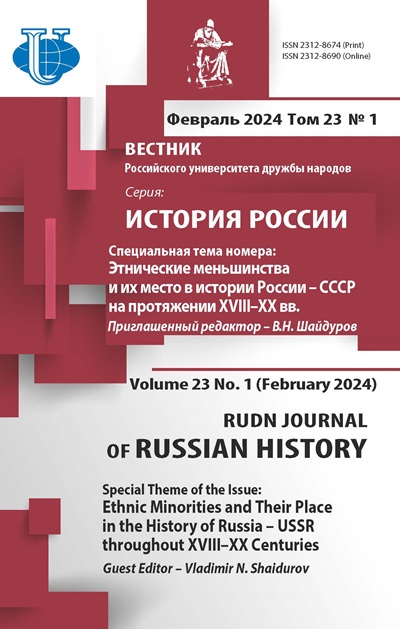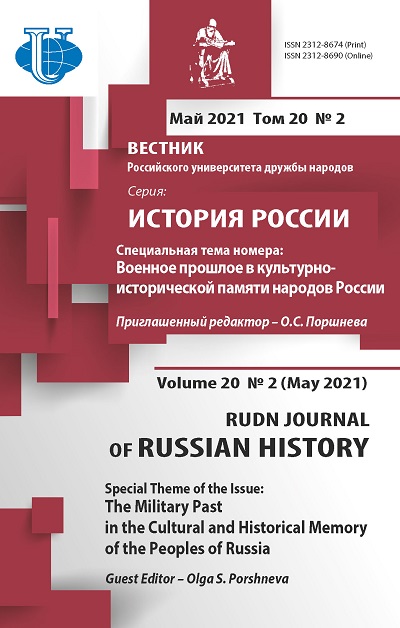The Politics of Russian Memory: The Great War in the European Context
- Authors: Porshneva O.S.1
-
Affiliations:
- Ural Federal University named after the first President of Russia B.N. Yeltsin
- Issue: Vol 20, No 2 (2021): The Military Past in the Cultural and Historical Memory of the Peoples of Russia
- Pages: 216-235
- Section: THE MILITARY PAST IN THE CULTURAL AND HISTORICAL MEMORY OF THE PEOPLES OF RUSSIA
- URL: https://journals.rudn.ru/russian-history/article/view/26591
- DOI: https://doi.org/10.22363/2312-8674-2021-20-2-216-235
Cite item
Full text / tables, figures
Abstract
This article examines how the historical memory of World War I emerged and developed in Russia, and also compares it to how Europeans have thought about the conflict. The author argues that the politics of memory differed during the Soviet and post-Soviet periods. In the wake of the 1917 Revolution, Bolshevik efforts to “re-format” the memory of the Great War were part of its attempt to create a new society and new man. At the same time, the regime used it to mobilize society for the impending conflict with the 'imperialist' powers. The key actors that sought to inculcate the notion of the war with imperialism into Soviet mass consciousness were the Central Committee of the Bolshevik Communist Party, the Department of Agitation and Propaganda, and, in particular, the Red Army and Comintern. The latter two worked together to organize the major campaigns dedicated to war anniversaries, which were important both to reinforce the concept of imperialist war as well as to involve the masses in public commemorations, rituals and practices. The Soviet state also relied on organizations of war veterans to promote such commemorative practices while suppressing any alternative narratives. The article goes on to explain how, under Stalin, the government began to change the way it portrayed the Great War in the mid-1930s. And after the Second World War, Soviet politics of memory differed greatly from those in the West. In the USSR the Great Patriotic War was sacralized, while the earlier conflict remained a symbol of unjust imperialist wars.
Keywords
About the authors
Olga S. Porshneva
Ural Federal University named after the first President of Russia B.N. Yeltsin
Author for correspondence.
Email: o.s.porshneva@urfu.ru
Doktor Istoricheskikh Nauk [Dr. habil. hist.], Professor, Head of the Department of Theory and History of International Relations
19 Mira St., Yekaterinburg, 620002, RussiaReferences
- Alekseeva, G.D. “Istoricheskaya nauka v Rossii posle pobedy Oktyabr'skoy revolyutsii.” In Rossiya v XX veke: Sud'by istoricheskoi nauki Rossiia v XX veke: sud’by istoricheskoi nauki, 43-58. Moscow: Nauka Publ., 1996 (in Russian).
- Bykova, S.I. “ ‘Punished memory’: evidence of the past in the investigative materials of the NKVD.” Emergency ration. Debates on politics and culture, no. 2 (2009): 38-54 (In Russian).
- Cohen, A.J. “Oh, That! Myth, Memory, and World War I in the Russian Emigration and the Soviet Union.” Slavic Review 62, no. 1 (2003).
- Dmitriev, P.N. “Organizations of former servicemen on the eve of the Izhevsk-Votkinsk uprising.” Idnakar, no. 1 (2014): 5-23 (in Russian)
- Golubinov, Ya.A. “Stoletie Pervoy mirovoy voiny v Velikobritanii i izuchenie konflikta v shkolakh korolevstva.” In Prepodavanie voennoy istorii v Rossii i za rubezhom, 69-72. Moscow; St. Petersburg: Nestor-Istoriia Publ., 2019 (in Russian)
- Heathorn, S. “The Mnemonic Turn in the Cultural Historiography of Britain’s Great War.” The Historical Journal, no. 48 (2005): 1103-1124
- Hellmann, Ben. “In Search of the Truth about the Great War: The Theme of War in the Works of Five Russian Writers.” In Russian Culture in War and Revolution, 1914-1922. Popular Culture, the Arts, and Institutions, 209-232. Bloomington: Indiana, 2014
- Hynes, S.A. War Imagined: The First World War and English culture. London: the Bodley Head, 1990.
- Khmelevskiy, G. Mirovaya imperialisticheskaya voina 1914-18 gg. Sistematicheskiy ukazatel' knizhnoy i stateynoy voenno-istoricheskoy literatury za 1914-1935 gg. Moscow: [N.s.], 1936 (in Russian).
- King, A. The Politics of Meaning in the Commemoration of the First World War in Britain, 1914-1939. London: University of London, 1993.
- Kolonitskii, B.I. “Pervaya mirovaya voina: kul'tura epokhi i sotsial'naya pamyat.” Zvezda, no. 11 (2014): 199-216 (in Russian).
- Lenin, V.I. “Proshhal’noe pis’mo k shveyczarskim rabochim.” In Polnoe sobranie sochineniy, 87-94. Moscow: Gospolitizdat Publ., 1974 (in Russian).
- Lohr, E., and Sanborn, J. “1917: Revolution as Demobilization and State Collapse.” Slavic Review 76, no. 3 (2017): 703-709.
- Malysheva, S.Yu. Sovetskaya prazdnichnaya kul'tura v provintsii: prostranstvo, simvoly, istoricheskie mify (1917-1927). Kazan: Ruten Publ., 2005 (in Russian).
- Mosse, G.L. Fallen Soldiers: Reshaping the Memory of the World Wars. New York; Oxford: Oxford University press, 1990.
- Nagornaia, O.S. “Musicalization of the First World War in Germany and Russia: Jubilee Exhibitions between Heroism and Humanism.” Perm University Journal, no. 4 (2014): 37-43 (in Russian).
- Nagornaia, O.S. “Plen Pervoy mirovoy voiny v sovetskoy khudozhestvennoy literature: konflikt i konsensus individual'nykh perezhivaniy.” In Bol'shaya voina Rossii: sotsial'nyi poryadok, publichnaya kommunikatsiya i nasilie na rubezhe tsarskoy i sovetskoy epokh, 127-140. Moscow: Novoe literaturnoe obozrenie Pubkl., 2014 (in Russian)
- Nikonova, O., and Raeva, T. “Pervaya mirovaya voina v prazdnichnoy kommemoratsii rannesovetskoy epokhi.” In Problemy istorii rossiyskogo sotsiuma, 4-23. Chelyabinsk: Tsentr nauch. Sotrudnichestva Publ., 2011 (in Russian).
- Nikonova, O.Yu. “Voennoe proshloe Rossii i sovetskiy patriotizm: k postanovke problem.” In Vek pamyati, pamyat' veka: Opyt obrashcheniya s proshlym v XX stoletii, 489-506. Chelyabinsk: Kamennyi poyas Publ., 2004 (in Russian).
- Nikonova, O.Yu. Vospitanie patriotov: Osoaviakhim i voennaya podgotovka naseleniya v ural'skoy provintsii (1927-1941 gg.). Moscow: Novyi khronograf Publ., 2010 (in Russian).
- Orlovsky, D. “Velikaya voina i rossiyskaya pamyat.” In Rossiya i Pervaya mirovaya voina, 49-57. St. Petersburg: Institut istorii RAN Publ., Dmitrii Bulanin Publ., 1999 (in Russian).
- Pakhalyuk, K.A. “Otrazhenie geroizma russkikh soldat i ofitserov Pervoy mirovoy voiny v memuarnoy literature sovetskogo perioda.” In Velikaya voina: sto let, 206-236. Moscow; Sankt Petersburg: [N.s.], 2014 (in Russian).
- Petrone, K. The Great War in Russian Memory. Bloomington and Indianapolis: Indiana University Press, 2011.
- Petrov, Yu. A. “Rossiya nakanune Velikoy revolyutsii 1917 g.: sovremennye istoriograficheskie tendentsii.” In Rossiiskaya revolyutsiya 1917 goda: vlast', obshchestvo, kul'tura, 12-26. Moscow: Political Encyclopedia Pubk., 2017 (in Russian)
- Pokrovskiy, M.N. Imperialisticheskaya voina. 1915-1930. Moscow: URSS Publ., 2010 (in Russian)
- Porshneva, O.S. Krest´yane, rabochie i soldaty Rossii nakanune i v gody Pervoy mirovoy Voiny. Moscow: ROSSPEN Publ., 2004 (in Russian)
- Raeva, T.V. “Memorialization of the First World War in the USSR: ‘Agicide’ as a way of forming memory.” Bulletin of the South Ural State University. Series: Social Sciences and the Humanities 14, no. 3 (2014): 11-13 (in Rusian)
- Rolf, M. Sovetskie massovye prazdniki. Moscow: ROSSPEN Publ., 2009 (in Russian)
- Senyavskaya, E.S. “Historical memory of the First World War: features of the formation in Russia and in the West.” Vestnik MGIMO-University, no. 2 (2009): 31-37 (in Russian)
- Tarkhova, N.S. “Kak sozdavalas' istoriya Pervoy mirovoy voiny (O deyatel'nosti Komissii po issledovaniyu i ispol'zovaniyu opyta voiny 1914-1918 gg.).” In Poslednyaya voina Rossiyskoy imperii. Rossiya, mir nakanune, v khode i posle Pervoy mirovoy voiny po dokumentam rossiyskikh i zarubezhnykh arkhivov, 27-36. Moscow: [N.s.], 2006 (in Russian)
- Ulyanova, S.B. “Campaign against imperialist wars in 1924: tasks, implementation, results.” Vestnik of Kostroma State University, no. 1 (2015): 41-44 (in Russian)
- Winter, J. Remembering War. The Great War Between Memory and History in the Twentieth Century. New Haven & London: [N.s.], 2006
- Winter, J. Sites of Memory, Sites of Mourning: The Great War in European Cultural History. Cambridge: [N.s.], 1996
















